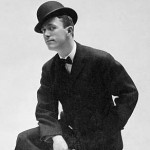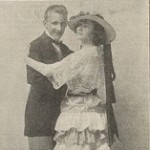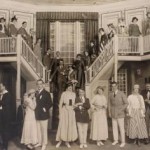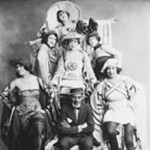It’s been noted that the form of modern musical theater came from operetta, but its soul came from the music hall. This union of body and soul took place during the first two decades of the 20th century, beginning with George M. Cohan. Born into a vaudevillian family, Cohan was steeped in music hall tradition. In 1901, he wrote his first musical, The Governor’s Son, for his family’s legitimate stage debut. While many composers were mimicking foreign operettas, Cohan wrote in the style of the sentimental waltzes popular in the 1890s. His breakthrough came in 1904 with Little Johnny Jones, a prototype of the modern musical, which introduced the songs “Give My Regards to Broadway” (listen here) and “The Yankee Doodle Boy” (listen here). By 1920, Cohan had created and produced more than 50 Broadway shows.
Ragtime, another popular music style of the 1890s, saw a resurgence in 1911 after vaudeville singer Emma Carus (star of the original 1907 Ziegfeld Follies) introduced Irving Berlin’s “Alexander’s Ragtime Band” (listen here), which George Gershwin called “the first real American musical work.” Three years later, Berlin wrote his first complete Broadway score for the Vernon and Irene Castle vehicle Watch Your Step, with a book by the prolific Harry B. Smith. Variety labeled the show the “first syncopated musical.” Berlin continued to contribute songs to revues but didn’t write another stage score until 1925. It was Jerome Kern who took up the banner and wove syncopation and jazz progressions into the DNA of musical theater.
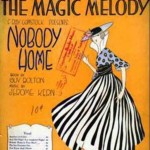 After music training in Germany, Kern spent several years in London. By 1911, he had contributed songs to some two dozen British musicals and American revues. In 1912, he wrote his first complete Broadway score for The Red Petticoat, a western musical with book and lyrics by Paul West and the prolific Rida Johnson Young. Later that year, the Shubert Brothers built the 299-seat Princess Theatre, for which agent Elisabeth Marbury asked Kern and Guy Bolton to create intimate (and low-budget) musicals. Their first Princess show was Nobody Home, an adaptation of a 1905 British musical. It was a modest success but didn’t satisfy Kern’s desire for innovation, although “The Magic Melody” (listen here) is noted as the first Broadway song with a basic jazz progression.
After music training in Germany, Kern spent several years in London. By 1911, he had contributed songs to some two dozen British musicals and American revues. In 1912, he wrote his first complete Broadway score for The Red Petticoat, a western musical with book and lyrics by Paul West and the prolific Rida Johnson Young. Later that year, the Shubert Brothers built the 299-seat Princess Theatre, for which agent Elisabeth Marbury asked Kern and Guy Bolton to create intimate (and low-budget) musicals. Their first Princess show was Nobody Home, an adaptation of a 1905 British musical. It was a modest success but didn’t satisfy Kern’s desire for innovation, although “The Magic Melody” (listen here) is noted as the first Broadway song with a basic jazz progression.
Kern and Bolton’s next musical was the original Very Good Eddie, which was a certified hit. Following the European tradition that had begun with Offenbach, Kern and Bolton integrated song and story, but their characters and situations were believable and their humor flowed out of the action, which took place in modern American settings. P.G. Wodehouse joined the Princess team experiments in 1917 for Oh, Boy! and the remaining four shows. Though this musical laboratory was a short-lived three years, the Princess shows built and polished the mold that subsequent musical comedies used.
As the Jazz Age gained energy, syncopated scores became more common on Broadway stages. Among the best was Shuffle Along, the 1921 hit by vaudeville veterans Noble Sissle and Eubie Blake that caused “curtain time traffic jams” on West 63rd Street. Its popularity not only launched the careers of Josephine Baker, Adelaide Hall, and Paul Robeson but also contributed to the desegregation of Broadway theaters, paving the way for musicals like Show Boat (1927), Kern’s best-known and most lasting work, written with Oscar Hammerstein II and Otto Harbach, which finally united musical theater’s body and soul in a masterful blend of operetta and vaudeville.
To sample musical theater’s first Golden Age, explore the book songs “I’m Just Wild About Harry” (listen here) from Shuffle Along (1921) then “Fascinating Rhythm” (listen here) from Lady Be Good (1924) and “Someone to Watch over Me” (listen here) from Oh, Kay! (1926), both by George & Ira Gershwin. Then move to the revue songs “My Man” (listen here) from Ziegfeld Follies (1921), “Manhattan” (listen here) from Garrick Gaieties (1925) by Rodgers & Hart, and “Ain’t Misbehavin’” (watch here) from Hot Chocolates (1929) by Fats Waller and Andy Razaf.

